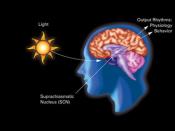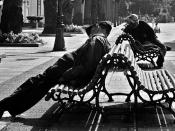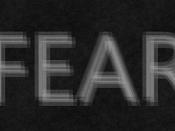A bump in the room, the squeak of a door, a breath of wind are all normal sounds in a lighted area. A bump in the room, the squeak of a door, a breath of wind are all normal sounds in a lighted area. However, when it becomes dark, our imagination pumps adrenaline through our body, our pulse quickens, we become more alert, and butterflies rustle in our stomachs. These same noises become whatever our imagination deems scary, and common objects become our nightmares. The dark has always made people unnerved , and as a result many movies, activities, and rituals are performed or made in the dark. This is not to say that the dark is a horrible occurrence, but for many people it creates either fear, or and apprehensive excitement. Why is that the depths of darkness create fear in ones mind, and how does it affect people? Our bodies run on a 24 hour cycle called a circadian rhythm.
During this time our temperature, mood, alertness, and chemical levels rise and fall at roughly the same time everyday. Take a look at your personal life. During the day you're constantly alert, moving, and thinking. Your mind is consumed with thoughts about your job, relationships, and small day-to-day dilemmas. For the most part, we do not analyze and process our daily routines and emotions, for we don't have the time or the energy.
However, it is when we reach the inactive part of our circadian rythm that we are forced to separate our problems and perturbations of the day. Often, this happens at night, in the dark, by ourselves. Having to come to grips with these obstacles that we may have crumpled up like a dirty pair of socks and tossed in a corner, is not an easy thing to do. Because these thoughts happen late in our circadian cycle, the elements of darkness our often present, thus associating feelings of uneasiness and displeasure with the dark. Now let's take another look at why the dark makes various people jitters and become petrified.
When you go to a horror flick, what kind of lighting is used? If you've ever played laser tag, is it played under stadium lights? What about the scary settings on TV or in movies, is there often little or no light? All of these instances you just read about occur with a small flicker, if any light at all. Of course there is a purpose to having those activities this way, got any ideas? It's all in the money and media. If the media plays up the scary moments in the dark, it makes the audiences more aware of what could happen I the night. By playing up the image of darkness being scary, the movies make more money because people actually want to pay to be scared in the dark. Think about it. Would you go to see a horror movie under ultraviolet lights? Another aspect that the movie plays up is the fact that the scary things happen in a normal homes, places, and every day people like you in me. Take the movie series Halloween for instance. An average girl is stalked by an "evil" man at her house, and at a hospital. These things happen a night, and in the depths of night. When we see these things, consciously or unconsciously we make the connection that the dark equals bad and scary.
Let's take a look at the last way in which people associate the dark with fear.
Observations. In science we make observations and conclude from them. We take what we observe, and make a conclusion based on the facts we've gathered. This is very similar to how people make the association that the color black is associated with the ominous and negative aspects of the dark. As we go about our lives we store and process what we see, learn, and experience. If a loved one dies, we go to a funeral. What do we sometimes wear? Black. If we see a picture of a gun, it's usually a dark color. As little kids we dress up in black if we were a witch, thus associating black with a mean and negative appearance. People joke about receiving black coal in their stocking for Christmas, yet really the thought of receiving that hideous black ornament is repulsive, again, making the connection that black is bad. After witnessing these negative happenings that society defines black as, we come to the conclusion of our observations, that being that once dark falls we are so fearful of it that we loath it.
So, how do you deal with being afraid of the dark? I don't believe you can. It's something that will always make some uneasy. It's a fear that has been ingrained in us from when we were little, and is not an easy thing to shake off.
Hopefully having a better understanding of why you're afraid of the dark will help. Remember that your circadian cycle, the media, and personal observations are some reasons as to why many people are afraid of the dark. The dark is an inevitable occurrence, and hopefully understanding why those fears held in the deep recessions of our minds are unleashed will help calm our terrors and put them back in perspective.





